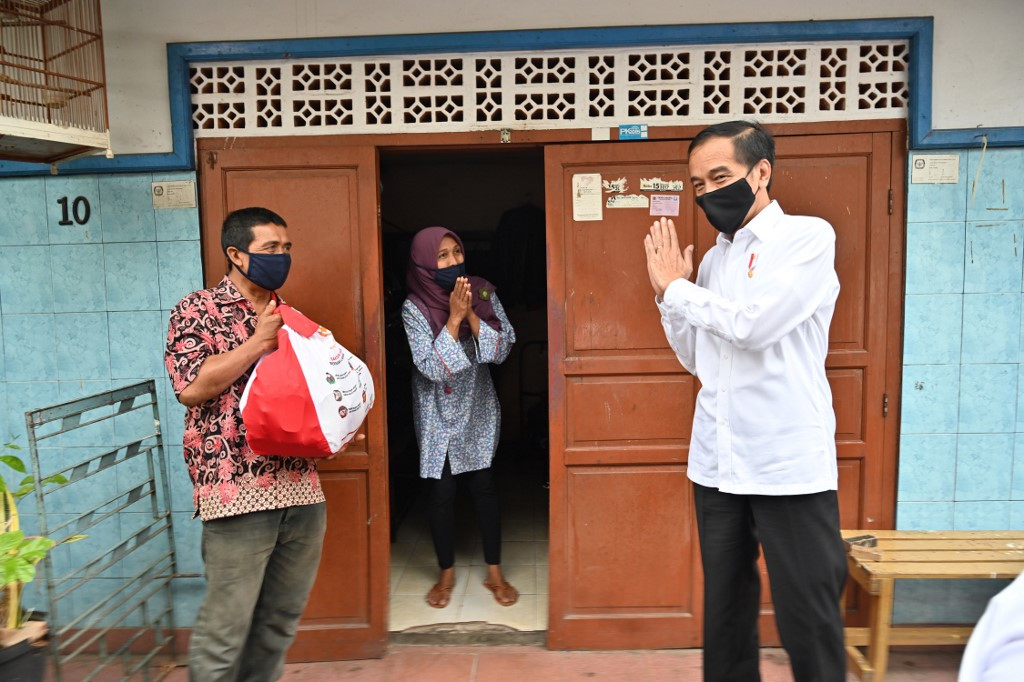Popular Reads
Top Results
Can't find what you're looking for?
View all search resultsPopular Reads
Top Results
Can't find what you're looking for?
View all search resultsWith policy flip-flops, 'new normal' looks gloomy for Indonesia
President Joko “Jokowi” Widodo has said the country must be ready for a “new normal” by July. With little commitment from the government and citizens to fight the virus, the future looks grim for the country.
Change text size
Gift Premium Articles
to Anyone
T
he COVID-19-stricken world has seen countries easing lockdowns and stay-at-home orders since the beginning of this month. But Indonesians have a right to worry after the government followed suit by relaxing travel restrictions on May 6.
First, the numbers of COVID-19 cases and deaths continue to rise across many provinces outside Jakarta. The Health Ministry announced 59 more deaths on Sunday, the highest one-day spike in over a month, bringing the death toll to 1,148 from 17,514 confirmed cases.
Second, the easing of restrictions, which allow people to travel for work purposes, came only about two weeks after a full ban was announced for all passenger travel and less than a month since provinces, cities and regencies formally enforced large-scale social restrictions (PSBB).
In other countries, including the United States, at least seven weeks of lockdown with strict measures were in place before they started to reopen.
Worse, only four out of 34 provinces and dozens of cities have applied the restrictions — all with a low-level of public compliance. In Java, the country’s most populous island, many areas have not formally implemented the restrictions, despite the fact that more than 60 percent of cases and about 80 percent of total deaths in the country have been recorded on the island.
Third, the number of tests conducted remains very low, at 140,000, compared to other countries. In the first months of the outbreak, the government argued about the lack of test kits and laboratory capacity. But today, with about 80 percent of the Rp 405 trillion (US$27.27 billion) in COVID-19 aid proposed by the government allocated to the economy instead of for the health response, it is reasonable to question the government’s commitment to battling the virus.
President Joko “Jokowi” Widodo has said the country must be ready for a “new normal” by July. With little commitment from the government and citizens to fight the virus, the future looks grim for the country.
With the system for this “new normal” hardly in place, making people return to work and school equates to putting more lives in danger. People will commute and interact without strict physical distancing rules and could cause harm not only to themselves, but also their friends and family members. And if more people are infected with the virus, health workers will face more hard work and greater risks after having labored tirelessly to treat patients for months.
The Jokowi administration must get its act together to make sure the “new normal” is safe for everyone. First and foremost is to coordinate policies and actions based on COVID-19 data rather than on political or business interests.
It is true that the restrictions have caused millions of people to be furloughed and laid off. But this is better than allowing people to go out unprotected and risk dying. There are many good practices from other countries that the government can learn from. All include steadfast implementation of public health protocols and a strong commitment to combating the virus.
It is also critical that the government implements one coordinated policy at a time, rather than having each institution work on its own initiative. The Transportation Ministry’s decision to relax travel restrictions seems uninformed, considering the high number of new cases and deaths. The government has set up the national COVID-19 task force. It would be better for decision making to take place at one table — rather than for each ministry to decide matters on their own.
Making the public health emergency the only priority should also be reflected in how the government allocates COVID-19 aid. As increased spending is allowed after the issuance of an extraordinary legal instrument, Perppu No. 1/2020, the government should not let other personal or institutional interests divert the money allotted for combating the virus.
The government has announced Rp 152 trillion for economic recovery programs, which include support for state-owned enterprises. The funds may be important for some state companies that provide vital services, such electricity operator PT PLN and oil and gas producer PT Pertamina.
However, funds will also go to national flag carrier PT Garuda Indonesia and steelmaker PT Krakatau Steel, which have been in financial troubles and are not priorities during the epidemic.
It would be better for the government to allocate more funds to strengthening the health response, especially for testing and providing adequate health facilities. More funds should also be allocated to support physical distancing measures and the strict implementation of public health principles when the PSBB measures are lifted entirely.
Trains and buses, for instance, cannot be fully occupied like they were before the outbreak. As a consequence, operators should increase their fleet sizes to still be able to shoulder the normal burden of servicing commuters.
The Jokowi administration can only succeed in leading the country out of the epidemic once it begins to treat it as an emergency – not a chance for political opportunism. The government would be irresponsible, if not reckless, to exploit the outbreak to fulfill its political goals.










